River White Granite originates from multiple quarry locations in South India, primarily near Melur in Madurai district (Tamil Nadu) and from quarries in Andhra Pradesh. The material is geologically classified as granulite—a high-grade metamorphic rock formed under intense temperature and moderate pressure conditions during the Precambrian period (over 2.5 billion years ago). While internationally marketed as granite for commercial purposes, European Standard applications require proper technical documentation designating this stone as granulite rather than granite.
The stone features a characteristic “bounded pattern” where the flowing grey veins create interconnected structures throughout the material. This pattern is not merely aesthetic; it contributes structural strength by distributing stress more evenly across the slab compared to uniform compositions. Because of this bounded pattern, River White demonstrates exceptional durability despite its light coloration and delicate appearance.
The creamy white to light grey base with flowing grey veins resembles a tranquil river or stream—the origin of its commercial name. Burgundy or blackberry-colored garnets scattered across the surface add depth and visual interest. This combination creates a look that mimics high-end marble aesthetics while providing the superior durability, scratch resistance, and stain resistance characteristic of granite and granulite materials.
Architects and designers specify River White for residential kitchen countertops seeking elegant yet practical surfaces, bathroom vanity tops requiring moisture resistance, commercial lobby flooring in hospitality and corporate environments, exterior building cladding where frost resistance is essential, landscape paving features, fireplace surrounds, backsplashes creating visual continuity, and monumental applications including headstones. The neutral color palette coordinates seamlessly with both contemporary minimalist and traditional design schemes, making it one of the most versatile white granite options available.
Performance and Quality
River White demonstrates performance characteristics suitable for demanding residential and commercial applications. Testing confirms frost resistance for exterior installations in freeze-thaw climates, making it appropriate for cold-region cladding, paving, and outdoor countertop applications where seasonal temperature cycling occurs. The granulite structure withstands thermal stress without deterioration when properly maintained.
The material resists heat damage typical of natural stone, withstanding temperatures to approximately 250°C (480°F) without cracking under normal use conditions. However, sudden extreme temperature changes can initiate thermal stress cracking. Users must employ trivets or hot pads for cookware placed directly from stovetops or ovens to prevent localized thermal gradients that might cause damage.
Scratch resistance derives from the hard mineral composition characteristic of high-grade metamorphic rocks. Normal kitchen utensil use will not damage polished surfaces, though cutting boards are recommended for food preparation to preserve both the stone and knife edges. The fine-to-medium grain structure provides excellent polishing characteristics that resist dulling over time with proper maintenance.
The material is highly resistant to heat, scratches, and stains when properly sealed, making it suitable for high-traffic residential and commercial spaces. The stone’s bounded pattern distributes stress effectively, reducing the risk of cracking from impact or structural movement compared to more uniform stone compositions.
Light-Reflective Properties and Design Considerations
River White’s light grey and white tones possess natural sheen that captures and amplifies light, making it particularly valuable for spaces requiring brightness enhancement. The reflective surface makes rooms feel larger, more open, and airier—especially beneficial in spaces with natural light from windows or skylights. When used in well-lit areas, the granite’s reflective properties brighten environments significantly, reducing artificial lighting needs during daytime hours.
This light-capturing characteristic makes River White especially popular for smaller kitchens, bathrooms, or commercial spaces where visual expansion is desired. The flowing grey veins add organic movement without overwhelming the clean, fresh appearance that defines the stone’s aesthetic appeal.
Materials and Construction
Granulite forms through high-temperature metamorphism of pre-existing rocks under conditions typically found at significant crustal depth. The process creates medium-to-coarse-grained rocks mainly composed of feldspars, sometimes associated with quartz and anhydrous ferromagnesian minerals. The distinctive burgundy or blackberry-colored garnets visible in River White result from specific pressure-temperature conditions during metamorphic crystallization.
The granoblastic texture—characterized by interlocking mineral grains of approximately equal size—provides structural integrity and excellent polishing characteristics. Granulites are closely allied to gneisses but differ in grain size (finer), foliation perfection (less developed), and garnet content (more frequent). These differences contribute to River White’s ability to take and hold a high polish while maintaining structural strength.
During fabrication, manufacturers may apply clear epoxy resin filler to micro-fissures or minor surface pitting during polishing. This treatment provides a smoother finished surface without compromising structural integrity or affecting performance under normal use conditions. Quality producers never use color enhancers, ensuring the stone’s natural appearance remains authentic.
Parameter |
Description |
| Slab Sizes | Gangsaw 280 x 180 CM up in 2, 3 CM, and other Cutter Slabs: 180 x 60 CM up in 2, 3 CM, and other |
| Tiles | 30×30, 30×60, 40×40, 60×40, 60×60, 60 x 90, 60×120 CM in various thicknesses and custom sizes |
| Thickness | 6 mm, 18 mm, 20 mm, 30 mm & custom options |
| Others | Window sills, thresholds, monuments, steps & treads, flagstones, and articles available in custom sizes |
| Finishes | Polished, honed, leathered, bush hammered, lepatora, flamed, shotblasted |
| Place of Origin | South India |
Maintenance and Care
River White requires straightforward maintenance suitable for busy residential and commercial environments. The stone demands regular sealing to prevent staining and maintain optimal performance. Apply quality impregnating (penetrating) sealer every 12-18 months for standard residential use. High-traffic commercial installations may benefit from sealing every 12 months.
Before applying sealer, test a small sample section—excessive sealing attempts on dense granulite may create residue film buildup rather than beneficial penetration. If water beads on the surface for 5+ minutes without soaking in, the stone retains adequate sealer protection and does not require immediate reapplication.
Daily cleaning requires only pH-neutral cleaner or mild dish soap with warm water applied with soft cloth or microfiber mop. Avoid harsh chemicals, acidic cleaners (vinegar, citrus-based products), or abrasive scrubbers that can etch or dull the polished finish. Do not use acids or bleach, as these can damage the surface or remove sealer protection.
Address spills promptly, particularly from coffee, tea, wine, oils, and colored beverages. While granulite demonstrates good stain resistance when properly sealed, prolonged exposure to pigmented liquids can potentially penetrate if sealer has degraded. Wipe spills immediately rather than allowing them to sit on the surface.
For kitchen countertops, establish routine of wiping surfaces after food preparation and using cutting boards to minimize direct contact with acidic foods and sharp objects. For flooring installations, daily dust mopping and weekly damp mopping with neutral cleaner maintain appearance. High-traffic commercial flooring benefits from professional deep cleaning annually with extraction equipment.
Expected service life for interior countertops ranges from 25 to 50+ years with proper maintenance and sealing. Flooring and exterior cladding typically provide 50 to 100+ years of functional performance based on documented performance of high-grade metamorphic dimension stones in infrastructure and architectural applications.
Alternative Names
River White Granite is also known internationally by other names such as White River Granite, Thunder White Granite, New River White Granite, Valley White Granite, and River Valley White Granite.
Pros & Cons
Advantages
- Marble aesthetics with granite durability: Creamy white with flowing veins mimics high-end marble while providing superior scratch and stain resistance
- Light-reflective properties: Natural sheen brightens spaces, captures natural light, makes rooms feel larger and airier
- Frost resistance verified: Documented performance in freeze-thaw environments suitable for cold-climate exterior applications
- Bounded pattern strengthens material: Interconnected veining distributes stress evenly, improving impact resistance compared to uniform compositions
Considerations
- Requires regular sealing: Must maintain 12-18 month sealing schedule to prevent staining; sealing maintenance is non-negotiable
- Color variation between slabs: Veining and garnet distribution vary considerably; same-quarry-face matching essential for large projects
- European nomenclature requirements: Must be specified as “granulite” (not granite) in EU/EN standard jurisdictions for regulatory compliance
Who Should Buy
Ideal Buyers
- Residential renovators seeking marble-like elegance with superior durability and lower maintenance for kitchen and bathroom projects
- Contemporary designers requiring light-reflective stone to brighten spaces and create open, airy environments
- Commercial architects specifying exterior cladding for cold-climate buildings requiring documented frost resistance
- Hospitality developers needing neutral, elegant stone for lobby flooring and reception areas that withstands heavy traffic
- Buyers appreciating natural variation who understand quarry-face matching requirements and value organic, flowing patterns
Not Recommended For
- Projects requiring perfectly uniform, no-variation stone with consistent color across all slabs (consider engineered quartz instead)
- Buyers seeking deeply saturated pure white appearance with zero grey veining (consider Thassos marble or quartz)
- EU/EN standard projects where specifiers cannot accommodate granulite classification requirements in technical documentation
- Buyers unwilling to maintain regular sealing schedule every 12-18 months
- Ultra-traditional designs preferring bold, dramatic veining patterns over subtle, flowing aesthetics
FAQs
Q1: What is the difference between granulite and granite, and why does River White’s classification matter?
Granulite is a high-grade metamorphic rock formed under intense heat and moderate pressure, while granite is an igneous rock from cooled magma. River White performs comparably to granite but must be specified as “granulite” in European Standard applications for regulatory compliance. This affects project documentation in EU jurisdictions but does not indicate inferior performance.
Q2: How does River White compare to Thunder White Granite—are they the same stone?
River White and Thunder White are closely related varieties, sometimes used interchangeably in commercial markets. Both are granulites from South India with similar light bases and veining. Thunder White typically exhibits more pronounced grey veining and comes from specific quarries near Melur, Madurai. They share alternative naming conventions but may vary in pattern intensity.
Q3: Why does River White need sealing more frequently than some other granites?
While River White demonstrates good performance, the fine-to-medium grain structure and garnet inclusions create micro-porosity that benefits from regular sealing. The light color also shows stains more readily than dark granites. Sealing every 12-18 months maintains optimal stain resistance. Test annually with water droplet; if it soaks in within 5 minutes, reseal immediately.
Q4: Can River White be used for outdoor kitchen countertops in cold climates?
Yes. River White demonstrates documented frost resistance suitable for freeze-thaw environments. The granulite structure withstands seasonal temperature cycling without deterioration. Apply quality marine-grade penetrating sealer before installation and maintain annual sealing schedule. Cover outdoor countertops during winter months for added protection.
Q5: Will River White slabs from different bundles match in color and pattern?
Not necessarily. Veining and color vary considerably between quarry faces and blocks. A small sample may not represent the whole slab’s appearance. For large projects requiring consistency, specify same-quarry-face blocks and request swatch sample approval before fabrication. This is critically important for installations exceeding 100 sq ft.
Q6: What makes River White’s “bounded pattern” structurally stronger than uniform granite?
The interconnected grey veining creates a bounded pattern that distributes stress more evenly throughout the slab. This network effect prevents crack propagation along single planes, unlike uniform compositions where stress concentrates along weakest zones. The pattern enhances impact resistance and reduces risk of cracking from structural movement.

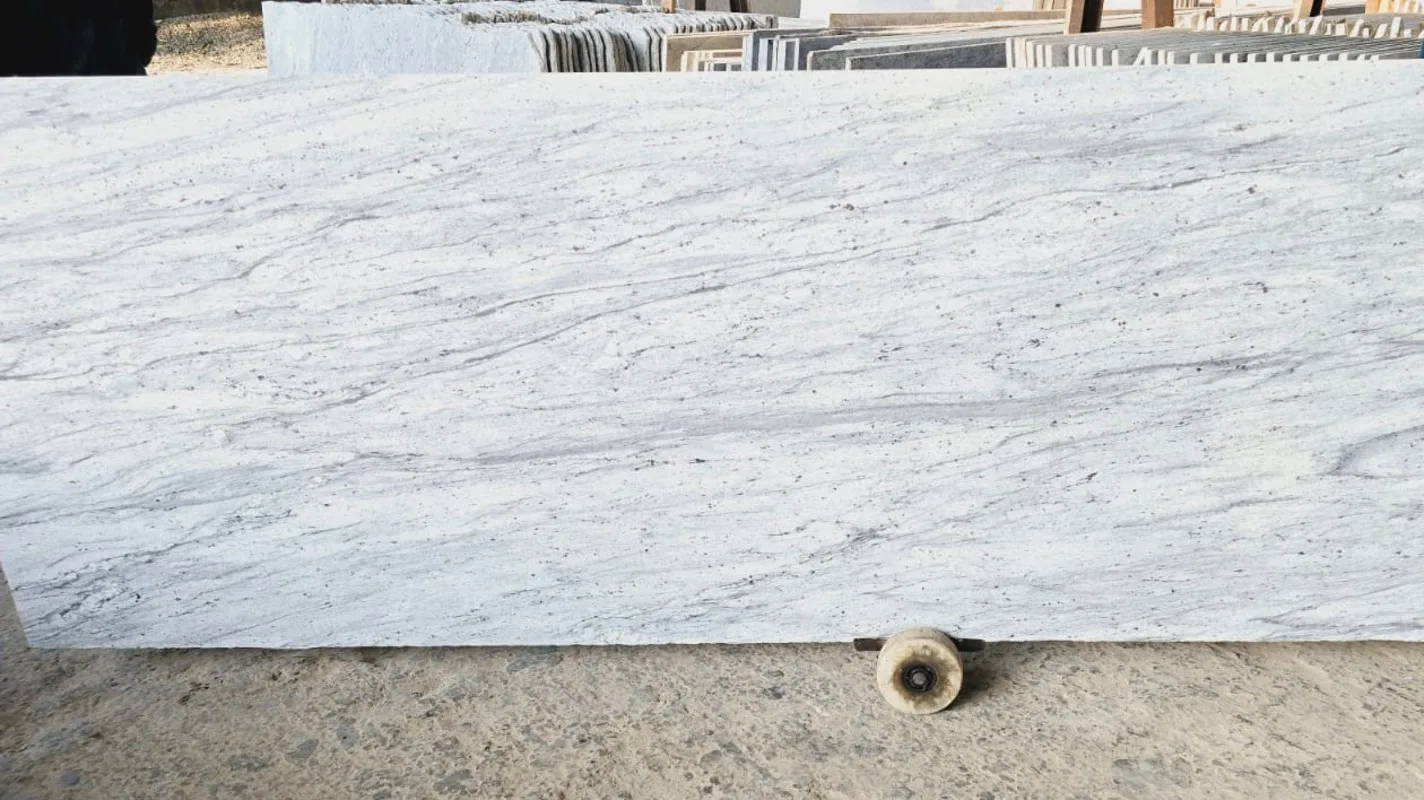

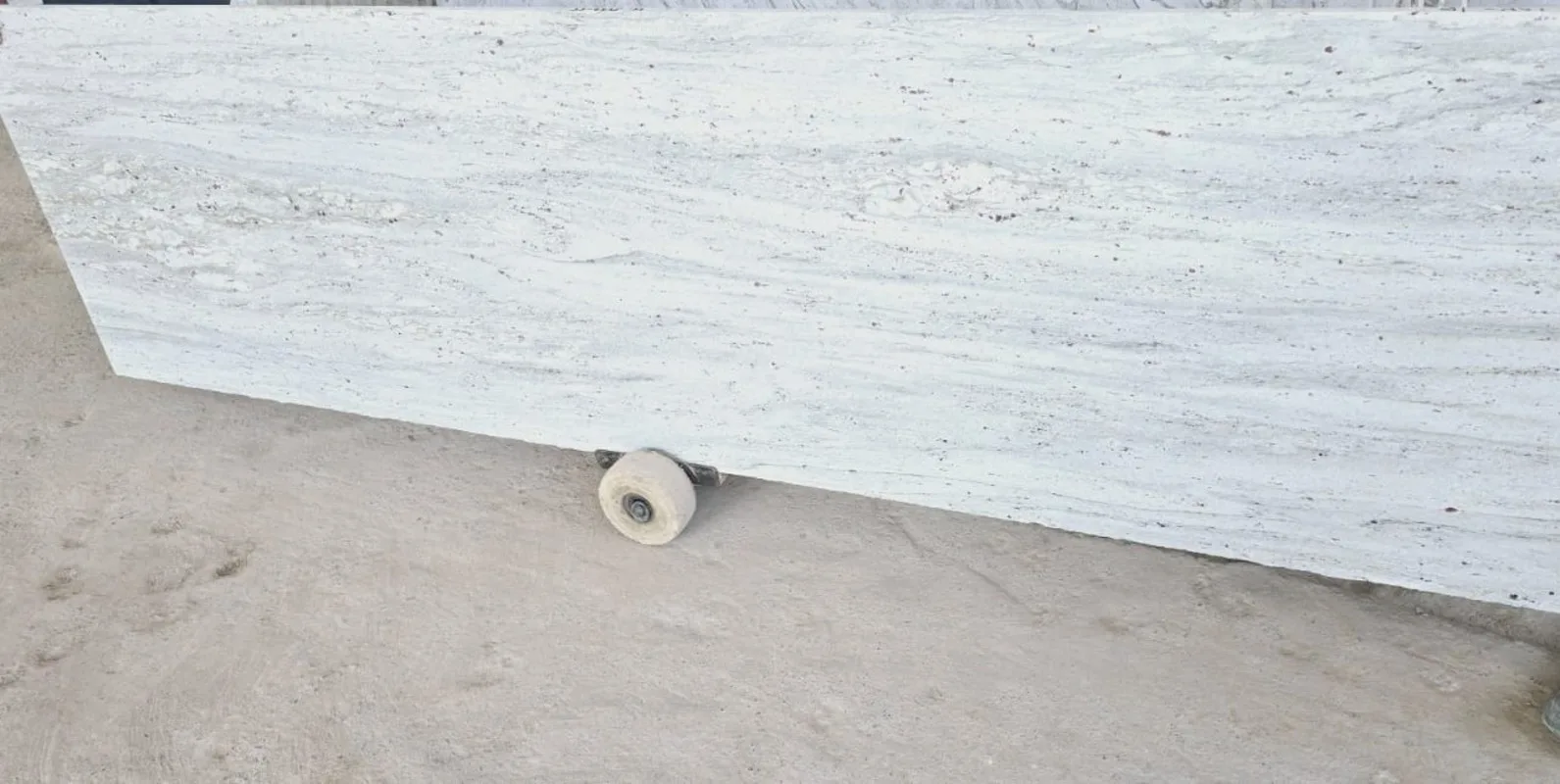
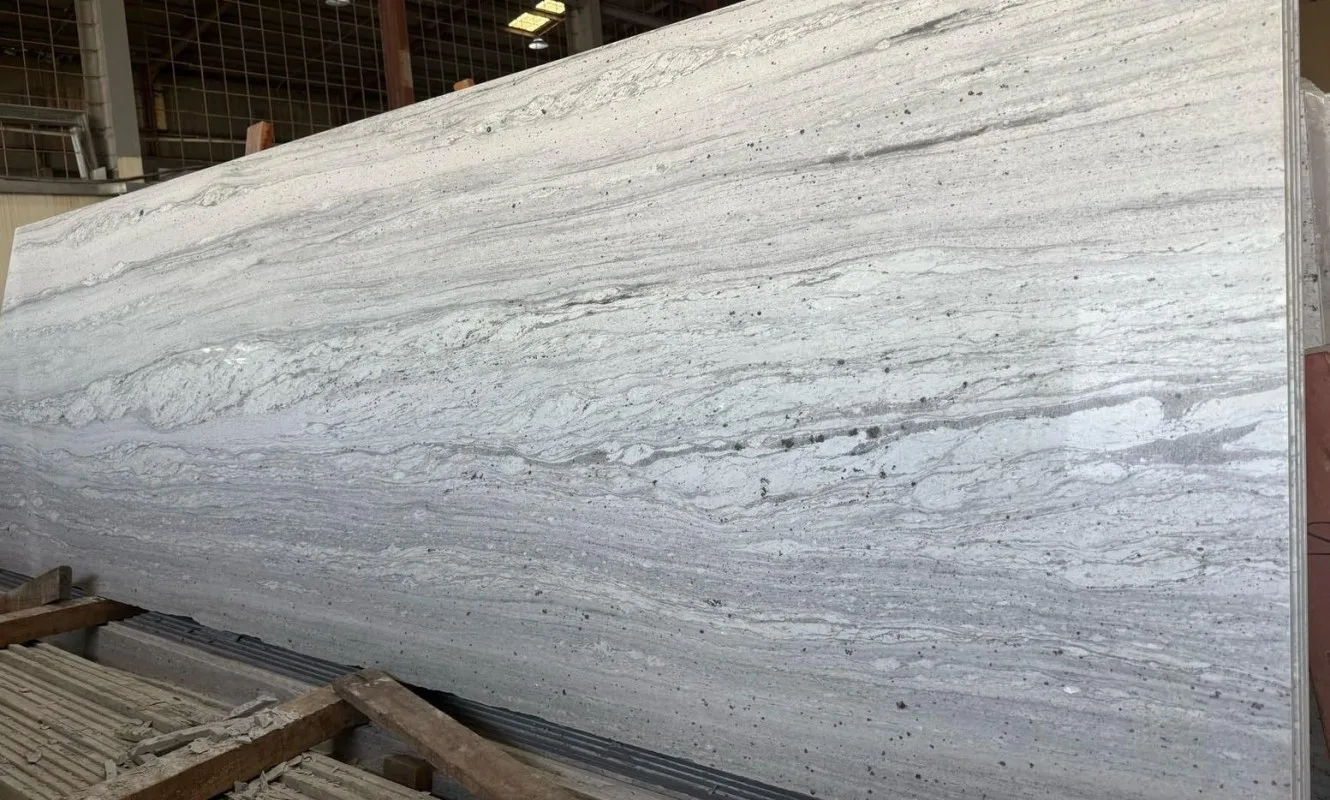
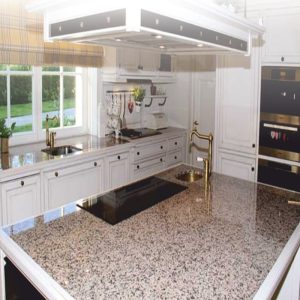
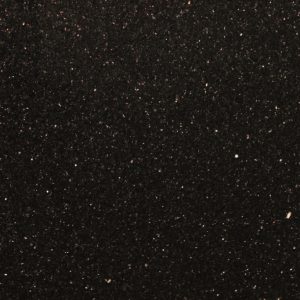
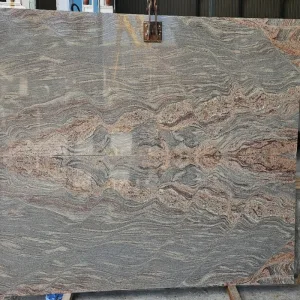
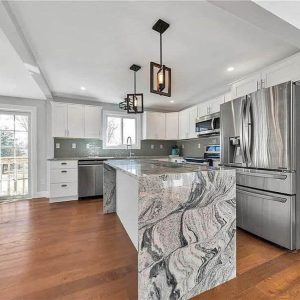
Reviews
There are no reviews yet.